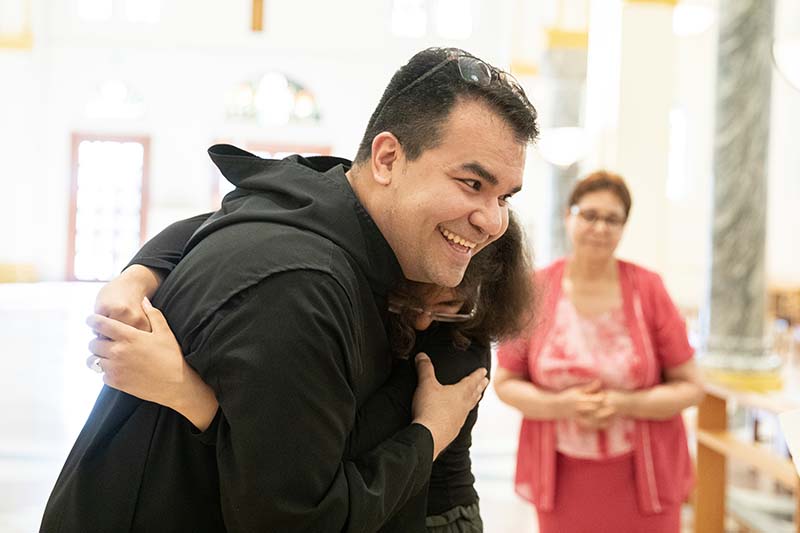Saved Together
Fr. Adrian Burke, OSB
Thursday, July 10, 2025

“Now the ladder [of humility] is our life...and we may call our body and soul two sides of this ladder into which our divine vocation has fitted the various steps of humility.”
Rule of Saint Benedict 7:8-9
“Keeping body and soul together” means being a healthy human being. For St. Benedict, humility is the essence of wholeness and Benedictine spirituality is centered on the discipline of humility. But at the heart of Benedictine humility lies the concept of community – a web of shared life and just relationships.
Jesus taught that we are saved together, not as mere individuals. In his healing miracles Jesus not only restores physical health but he also restores community by removing what isolates people from others. To heal a man of physical blindness means he can now work to support his family; healing a woman of a twelve-year hemorrhage means she is no longer considered “ritually impure” so she can be with the community at worship; Jesus removes demons from those who have been “demonized” and restores them to their rightful place in society; he heals the “unclean” of skin diseases due to which they were banned from social life. In short, Jesus unites what is divided and restores people by restoring them to community. During COVID, it was hard on people to be “socially distanced”. Imagine that as a permanent situation! For many in Jesus’ day it was – until he healed them, that is.
Wendel Barry, a spiritual thinker whose writing I enjoy, notes that the English word “heal” shares the same word-root as our English words whole and holy. For Jesus, to heal a person entails something far more, and far better, than merely a physical cure. For Jesus, to heal is to restore a person to community where they can once again be surrounded and supported by a “thick web of relationships”. For St. Benedict, no individual member of the community can be healthy in isolation from the community. Shared life is the basis of Christian “holiness”, the supreme form of human health.
Again, Wendel Barry: “I believe that the community … is the smallest unit of health and that to speak of the health of an isolated individual is a contradiction in terms.” St. Paul wrote that “in [God] we live and move and have our being” (Acts 17:28). God is revealed by Jesus as a community of divine Persons (Father, Son, and Holy Spirit). In Christ, we belong to a communion of shared (divine) Life because, in Christ, we belong to God. To treat our neighbor as if they were “cogs in a machine” instead of persons to be loved, is to see ourselves too as mere “cogs” instead of co-members of a web of relationships. This reflects the heart of Jesus’s supreme commandment to love the neighbor “as self” because it requires that we see ourselves as persons “belonging one to another” (Rom 12:5).
Personal happiness issues from a thick web of good and just relationships, shared with a community that protects our human dignity and well-being. Humility, dignity, well-being, and genuine community are building blocks of true and lasting peace and holiness (wholeness). The Latin word Pax (peace) is the “motto” of our Benedictine life. In the language of Jesus Shalom (peace) is a word that also conveys health, wholeness, and well-being, none of which is possible in isolation from community. Let peace be your quest and aim (RB Prol. 17) and the peace of Christ rule in your hearts (Col 3:15)… no matter what!